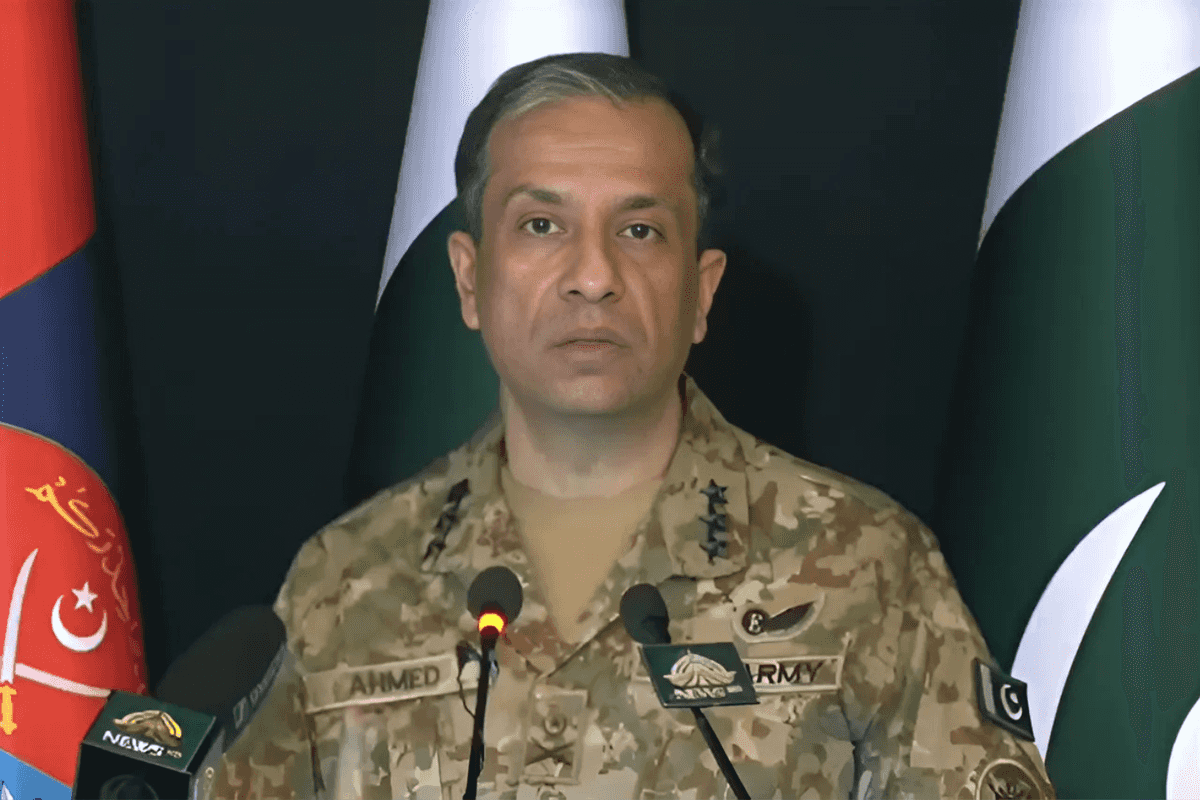Pakistan presents ‘evidence’ of India’s cross-border terrorism
Military spokesperson says India ’sponsored’ multiple IED attacks in Pakistan in recent months; says their key handler has now been arrested
News Desk
The News Desk provides timely and factual coverage of national and international events, with an emphasis on accuracy and clarity.

DG ISPR Lt-Gen Ahmed Sharif Chaudhry addressing a press conference in Rawalpindi on Tuesday, April 29, 2025.
Screengrab
Pakistan’s military on Tuesday accused India of sponsoring terrorism inside Pakistan and claimed it had “irrefutable evidence” of a cross-border network directed by Indian army officers.
The announcement came just days after India blamed Pakistan for a deadly attack in the Indian-administered Kashmir that killed 26 tourists.
Lt-Gen Ahmed Sharif Chaudhry, the chief spokesperson for Pakistan’s military, said India was orchestrating attacks through a network of operatives and handlers inside Pakistan.
“Today’s meeting has an aim to give you particular details of an important aspect about cross-border incidents in Pakistan which India is spearheading,” the general told reporters during a televised press conference in Rawalpindi.
He said Indian-trained and -sponsored terrorists were targeting civilians and security personnel inside Pakistan.
“We will identify a network today and provide irrefutable evidence,” Chaudhry said.
He said a key suspect, Abdul Majeed, was arrested four days earlier near a bus stand in the city of Jhelum. Authorities recovered a 2.5kg improvised explosive device (IED) and PKR 70,000 in cash.
An Indian-made drone was later found at Majeed’s home.
Majeed, Chaudhry added, was in contact with a handler codenamed “Sikander” — identified as Subedar Sukhwinder, a serving junior commissioned officer in the Indian army.
“There are four other characters and their cell was being handled by Major Sandeep Verma,” he said. “He is the officer commanding of Indian Army and he is serving in Indian-administered Kashmir.”
The spokesperson claimed that four Indian army officers had been identified in connection with a wider network behind “sponsoring terrorism in Pakistan.”
He also played an audio clip, allegedly featuring a serving Indian major discussing how terror financing routes run from Balochistan to Lahore.
“This is what you call irrefutable evidence,” Chaudhry said, adding that Majeed was linked to at least four terror incidents.
Chaudhry provided further details of two attacks carried out in 2024.
In the first incident, an IED planted in October in the Bagh district of Pakistan-administered Kashmir injured three Pakistani army officers. Chaudhry said the device had been delivered by Subedar Sukhwinder.
A second attack occurred on Nov. 30 near Jalalpur Jattan. An IED blast targeted an army vehicle, injuring four officers. Chaudhry claimed Majeed was promised more than PKR 650,000 for that operation but he eventually received only PKR 60,000.
Chaudhry said a third IED attack was planned on March 18 in Chahroi, in the Kotli district. However, the device was discovered by local residents before it could cause harm.
A fourth attack, he added, was planned for April 25 at the Jhelum bus stand. The suspect had received an advance payment of PKR 100,000, but was apprehended before the attack could be carried out.
“They tasked all their assets — terrorists operating in Balochistan and independent sleeper cells like the one we exposed today,” he said. “They were told to increase their activities after the Pahalgam incident. So far, 71 terrorists have been killed.”
In closing, Chaudhry said India was carrying out “state-sponsored terrorism” in Pakistan.
“Our armed forces and our resilient nation are standing tall in the face of these daily challenges,” he said. “That is why we come before you to say: nothing can undo this Pakistan.”
At the beginning of the presser, the DG ISPR said a detailed media briefing on the ongoing Pakistan-India situation will be held tomorrow (April 30), including a question-and-answer session.
The press conference followed Pakistan’s own accusation that India was behind a train hijacking in Balochistan last month.
On March 11, militants from the Balochistan Liberation Army (BLA) attacked the Jaffar Express, a passenger train traveling from Quetta to Peshawar. They blew up part of the track, opened fire, and briefly took passengers hostage.
Pakistan said the attackers were aided by Indian intelligence and described the incident as part of a broader campaign to destabilize Balochistan.
Tensions between the nuclear-armed neighbors have sharply escalated since the Kashmir attack earlier this month.
India has suspended the Indus Waters Treaty, a decades-old water-sharing agreement, citing Pakistan’s alleged support for terrorism.
New Delhi said the treaty would remain suspended until Islamabad “credibly and irrevocably abjures its support for cross-border terrorism.”
Pakistan rejected the accusation and condemned the move as a breach of international law.
Islamabad has also suspended trade ties with India and closed its airspace to Indian aircraft.
The two countries have fought three wars since their partition in 1947, two of them over the disputed Kashmir region.







Comments
See what people are discussing